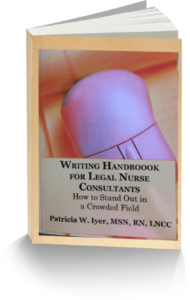Does correct punctuation make a difference in LNC reports?
 Does correct punctuation make a difference? Only if you want to present yourself as a polished legal nurse consultant. Consider the way punctuation changes the meaning of this message.
Does correct punctuation make a difference? Only if you want to present yourself as a polished legal nurse consultant. Consider the way punctuation changes the meaning of this message.
Dear Jack,
I want a man who knows what love is all about. You are generous, kind, thoughtful. People who are not like you admit to being useless and inferior. You have ruined me for other men. I yearn for you. I have no feelings whatsoever when we’re apart. I can be forever happy – will you let me be yours?Jill Dear Jack,
I want a man who knows what love is. All about you are generous, kind, thoughtful people, who are not like you. Admit to being useless and inferior. You have ruined me. For other men I yearn! For you I have no feelings whatsoever. When we’re apart I can be forever happy. Will you let me be? Yours,
Jill
Thanks to Rooks, S. Punctuate like a pro!
Correct Punctuation
I’ve edited thousands of legal nurse consulting reports. Here are some ABCs of rules to follow.
Ampersands
The ampersand & is used in casual settings. Do not include it in a formal report. I routinely recommended to LNCs that they spell out ampersands into the word “and”.
“I reviewed reports & depositions.” (incorrect)“I reviewed reports and depositions.” (correct)
Brackets
Brackets are used to enclose parenthetical or explanatory material that occurs within material that is already enclosed within parentheses. I find LNCs are usually confused as to when to use brackets and therefore do not use them when they are appropriate.
This is correct:“We decided to request the policy and procedure manual. (The facility [Chestershire Medical Center] refused to release the requested material.)
Capitalization
I encounter LNCs who use what I call idiosyncratic capitalization. These LNCs are unsure as to what to capitalize, so they add capital letters to words that do not need them. (Rarely do I see people who omit capital letters altogether.)
Here is what you should capitalize.
- sections of the country and world, but not directions
- names of races and nationalities
- the first word, last word and all the main words of headings and subject lines
- names of people, places, schools, religions and organizations
- months, days of the week and holidays
- names of brands
- initials of a person
- the first word, last word and all the main words in titles of books, plays, movies, articles, essays, poems and short stories
- sentences, quotations, and complimentary closings (Very truly yours)
- names of departments within a company or organization (he was on staff of the Surgery Department)
Notice that I did not list medical diagnoses or names of surgeries. It is correct to write “She suffered from appendicitis and underwent an appendectomy.”
Correct: She is from the East Coast.Correct: She walked east from the nursing home.
Capitalize the first word of a title and all words within a title except for prepositions, conjunctions, and the words “a”, “and” and “the”.
Correct: Dr. Mallick, the Director of Medical Affairs, is in charge of credentialing.

Colons
This is another type of correct punctuation that confuses some LNCs. A colon introduces the part of a sentence that exemplifies, restates, elaborates, undermines, explains, or balances the preceding part. It makes the second thought the most important part of the sentence. The first part of the sentence before the colon is a complete sentence that could stand on its own.
Correct: The nurses needed one thing to remain calm: an experienced supervisor.Correct: This much is clear, Attorney Hines: it is a defensible case.
Correct: Nurse Bosic had one rule when she came into the office: always check the work schedule for call outs.
Use a sentence or portion of a sentence before bulleted or numbered items in a list. End the first part of the sentence with a colon.
Correct: The patient had the following nursing diagnoses:
- Anxiety related to hospitalization
- Impaired airway clearance related to mucous plugs
Use a colon to separate subtitles from titles.
Example: SBAR: Creating Clear Communication
Finally, when you write your letter to your client, use a colon after a salutation (person’s name) in a formal letter.
Example: Dear Mr. Quinn:
 Consult a credible source when you are unclear how to use correct punctuation. I assembled lots of guidelines for correct use of grammar, spelling, punctuation, report formats, resumes and much more in Writing Handbook for LNCs. Order it here.
Consult a credible source when you are unclear how to use correct punctuation. I assembled lots of guidelines for correct use of grammar, spelling, punctuation, report formats, resumes and much more in Writing Handbook for LNCs. Order it here.

